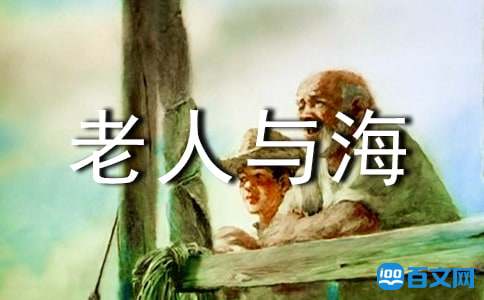双语散文阅读《老人与海》节选
《老人与海》的主人公桑地亚哥是一位老渔夫,他经过重重艰险,捕获了“一条不止一千五百磅重的大马林鱼”,但这条大马林鱼却被鲨鱼吃光了,桑地亚哥只拖回了一副鱼的骨架。这部小说被称为是影响历史的百部经典之一;美国历史上里程碑式的32本书之一。今天我们来欣赏《老人与海》的片段。

The Old Man and the Sea
He was an old man who fished alone in a skiff in the Gulf Stream and he had gone eighty-four days now without taking a fish. In the first forty days a boy had been with him. But after forty days without a fish the boy’s parents had told him that the old man was now definitely and finally salao, which is the worst form of unlucky, and the boy had gone at their orders in another boat which caught three good fish the first week. It made the boy sad to see the old man come in each day with his skiff empty and he always went down to help him carry either the coiled lines or the gaff and harpoon and the sail that was furled around the mast. The sail was patched with flour sacks and furled, it looked like the flag of permanent defeat.
The old man was thin and gaunt with deep wrinkles in the back of his neck. The brown blotches of the benevolent skin cancer the sun brings from its reflection on the tropic sea were on his cheeks. The blotches ran well down the sides of his face and his hands had the deep-creased scars from handling heavy fish on the cords. But none of these scars were fresh. They were as old as erosions in a fishless desert.
Everything about him was old except his eyes and they were the same color as the sea and were cheerful and undefeated.
“Santiago,” the boy said to him as they climbed the bank from where the skiff was hauled up. “I could go with you again. We’ve made some money.”
The old man had taught the boy to fish and the boy loved him.
“No,” the old man said. “You’re with a lucky boat. Stay with them.”
“But remember how you went eighty-seven days without fish and then we caught big ones every day for three weeks.”
“I remember,” the old man said. “I know you did not leave me because you doubted.”
“It was papa made me leave. I am a boy and I must obey him.”
“I know,” the old man said. “It is quite normal.”
“He hasn’t much faith.”
“No,” the old man said. “But we have. Haven’t we?”
“Yes,” the boy said. “Can I offer you a beer on the Terrace and then we’ll take the stuff home.”
“Why not?” the old man said. “Between fishermen.”
They sat on the Terrace and many of the fishermen made fun of the old man and he was not angry. Others, of the older fishermen, looked at him and were sad. But they did not show it and they spoke politely about the current and the depths they had drifted their lines at and the steady good weather and of what they had seen. The successful fishermen of that day were already in and had butchered their marlin out and carried them laid full length across two planks, with two men staggering at the end of each plank, to the fish house where they waited for the ice truck to carry them to the market in Havana. Those who had caught sharks had taken them to the shark factory on the other side of the cove where they were hoisted on a block and tackle, their livers removed, their fins cut off and their hides skinned out and their flesh cut into strips for salting. When the wind was in the east a smell came across the harbor from the shark factory; but today there was only the faint edge of the odor because the wind had backed into the north and then dropped off and it was pleasant and sunny on the Terrace.
“Santiago,” the boy said.
“Yes,” the old man said. He was holding his glass and thinking of many years ago.
“Can I go out to get sardines for you for tomorrow?”
“No. Go and play baseball. I can still row and Rogelio will throw the net.”
“I would like to go. If I cannot fish with you. I would like to serve in some way.”
“You bought me a beer,” the old man said. “You are already a man.”
“How old was I when you first took me in a boat?”
“Five and you nearly were killed when I brought the fish in too green and he nearly tore the boat to pieces. Can you remember?”
“I can remember the tail slapping and banging and the thwart breaking and the noise of the clubbing. I can remember you throwing me into the bow where the wet coiled lines were and feeling the whole boat shiver and the noise of you clubbing him like chopping a tree down and the sweet blood smell all over me.”
“Can you really remember that or did I just tell it to you?”
“I remember everything from when we first went together.”
The old man looked at him with his sun-burned, confident loving eyes.
老人与海
老人独自划着小船在墨西哥湾暖流钓鱼。整整84天过去了,他还是一条鱼也没逮着。头40天里,有个男孩一直跟着他。可是过了40天,老人还没抓到一条鱼,孩子的父母就对孩子说,老人如今真是倒霉透顶了,这个男孩于是听从了他们的吩咐,上了另外一条船。这条船在头一个礼拜捕到了三条大鱼。看着老人每天回来时船总是空的,孩子感到很难过。他总是走到岸边,帮老人拿成卷的渔线,或者渔钩和渔叉,还有绕在桅杆上的帆。老人用面粉袋的布片在帆上打满补丁,帆收拢后看上去就像是一面永远失败的旗子。
老人消瘦而憔悴,脖颈上布满了深深的皱纹。肋帮上有些黄褐斑,一直从脸的两侧蔓延下去,这是老人长时间在热带海洋上捕鱼时受太阳反光照射形成的。他的双手被绳索磨出了一条深深的伤疤,那是老人在对付大鱼时留下的。但是这些伤疤中没有一块是新的,它们像是沙漠中枯裂的岩石。
老人身上的一切都显得很苍老,除了他那双眼睛。它们像海水一样蓝,总是透着股乐观向上、永不服输的劲头。
“桑地亚哥爷爷!”当他俩从小船停靠的地方爬上岸时,孩子大声对他说,“我又可以和你一起去打鱼了。我在那条船上已经赚了一点儿钱了。”
老人一直在教孩子捕鱼,孩子很喜欢他。
“不,”老人说,“你上了一条运气不错的船。跟他们在一起吧。”
“但是您还记得有一次,您87天都没钓到一条鱼,后来连着三个礼拜我们天天都抓到大鱼吗?”
“我当然记得。”老人说,“我知道,你不是因为信不过我才离开的。”
“是爸爸叫我走到。我是他儿子,不能不听他的。”
“我明白,”老人说,“孩子应该听大人的话。”
“他对您没什么信心。”
“是啊,”老人说,“可是我们有信心,不是吗?”
“对!”孩子说,“我请您到露台餐馆喝杯啤酒,然后我们一起把打鱼的东西拿回去,好吗?”
“好啊,”老人说,“咱俩还说什么呢?”
他们坐在餐馆的露台上, 不少年轻的渔夫拿老人开玩笑,老人并不生气。另外一些上了年纪的渔夫看着他,感到很难受。不过他们并没有流露出来,只是有分寸地谈论着海流,谈他们放渔线的深度,谈多日来的好天气和他们的所见所闻。当天捕到鱼的渔民们都已回来,他们把大马林鱼剖开,整片儿平放在两块木板上,每块木板的一头由两个人抬着,摇摇晃晃地把鱼送到鱼仓里,在那里等冷藏车来把它们运往哈瓦那的市场出售。捕到鲨鱼的'人们已把他们送到海湾另一边的鲨鱼加工厂里。在那里,人们用滑轮车把鲨鱼吊起来,挖出肝脏,割掉鱼鳍,剥下鱼皮,把鱼肉切成条状,以备腌制。
刮风的时候,人们总能够闻到从隔着海湾的鲨鱼加工厂飘来的一股鱼腥味;但今天只是淡淡的一丝气味,因为风转了方向,最后风渐渐停了。现在露台餐馆这边阳光明媚,让人感觉很舒服。
“桑地亚哥爷爷!”孩子叫到。
“嗯。”老人应了一声。他拿着酒杯,想着好多年前的事儿。
“我去给您准备好明天用的沙丁鱼好吗?”
“不用了,你去打棒球吧。我还划得了船,罗吉立奥会帮我撒网的。”
“可我很想去。我不能和您一起钓鱼,就让我做点别的事吧。”
“你已经请我喝了啤酒呀。”老人感谢道,“你都是个男子汉了。”
“您第一次带我上船时,我几岁呀?”
“五岁。还记得那次我捕的那条鱼吗?它又大又壮,差一点把咱们的船撞个粉碎,你也差一点送了小命。”
“我记得鱼尾巴噼啪噼啪地拍打着,船上的座板都给打断了,船上的木棍也当当地响。我记得您怕我摔出去,还把我推倒在船头那堆湿漉漉的渔线上。我感到整条船都在摇晃,而您用棍子打鱼时发出的啪啪声,就像是风在吹树的声音。鱼血溅了一身,弄得我浑身上下都是血腥味儿。”
“是你自己记得那回事儿,还是我刚跟你说的?”
“从我们头一回一起出海到现在,那些事儿我可都记得清清楚楚。”
老人用他那双有着晒斑的眼睛看着孩子,眼里充满了信任和慈爱。